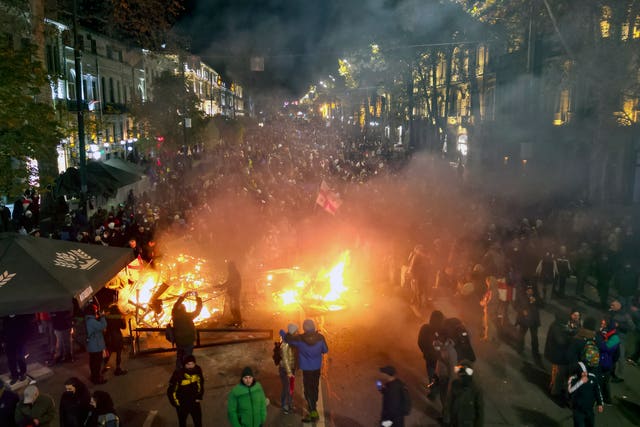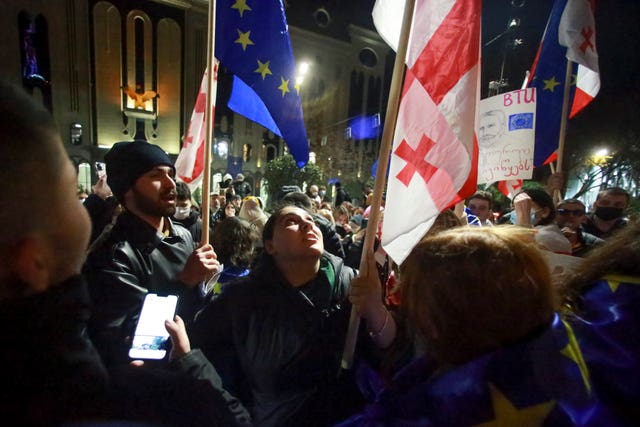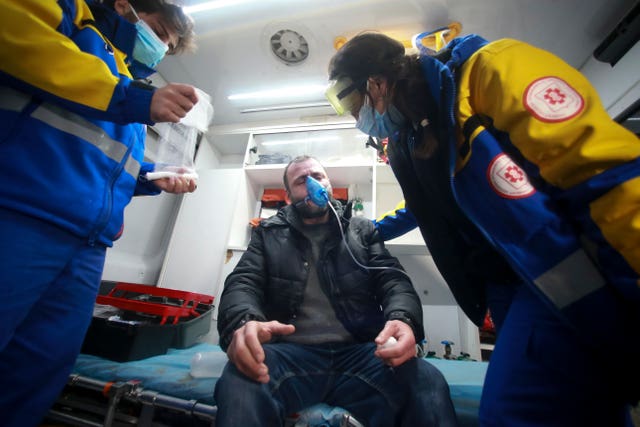
Thousands of demonstrators protesting the Georgian government’s decision to suspend negotiations to join the European Union rallied outside the parliament and clashed with police outside parliament for a second straight night on Friday.
The night before, police used water cannons, pepper spray and tear gas to disperse protesters who took to the streets in Tbilisi, the Georgian capital, after Prime Minister Irakli Kobakhidze of the ruling Georgian Dream party announced the suspension.
The interior ministry said it detained 43 people during the protests.

On Friday evening, protesters again swarmed the parliament, with some trying to break the metal gates to the building.
Riot police used water cannons to drive them back and later moved to push some of the demonstrators away from the area.
Georgian Dream’s disputed victory in the October 26 election, which was widely seen as a referendum on the country’s aspirations to join the European Union, has sparked massive demonstrations and led to an opposition boycott of the parliament.
The opposition said the vote was rigged under the influence of Russia seeking to keep Georgia in its orbit.
President Salome Zourabichvili joined protesters on Thursday after accusing the government of declaring “war” on its own people.
In Friday’s address to the nation, Ms Zourabichvili urged police not to use force against protesters.

The Georgian president, who has a largely ceremonial role, has declared that the ruling party rigged the election with the help of Russia, Georgia’s former imperial master.
The government’s announcement that it was suspending negotiations to join the EU came hours after the European Parliament adopted a resolution that condemned last month’s vote as neither free nor fair, representing yet another manifestation of the continued democratic backsliding “for which the ruling Georgian Dream party is fully responsible”.
European election observers said October’s vote took place in a divisive atmosphere marked by instances of bribery, double voting and physical violence.
The EU granted Georgia candidate status in December 2023 on condition that it meet the bloc’s recommendations, but put its accession on hold and cut financial support earlier this year after the passage of a “foreign influence” law widely seen as a blow to democratic freedoms.
EU legislators urged for a re-run of the parliamentary vote within a year under thorough international supervision and by an independent election administration.
They also called on the EU to impose sanctions and limit formal contacts with the Georgian government.

The Georgian prime minister fired back, denouncing what he described as a “cascade of insults” from the EU politicians and declaring that “the ill-wishers of our country have turned the European Parliament into a blunt weapon of blackmail against Georgia, which is a great disgrace for the European Union”.
“We will continue on our path toward the European Union; however, we will not allow anyone to keep us in a constant state of blackmail and manipulation, which is utterly disrespectful to our country and society,” Mr Kobakhidze said.
“We must clearly show certain European politicians and bureaucrats, who are completely devoid of European values, that they must speak to Georgia with dignity, not through blackmail and insults.”
Mr Kobakhidze also said Georgia would reject any budgetary grants from the EU until the end of 2028.
Critics have accused Georgian Dream — established by Bidzina Ivanishvili, a shadowy billionaire who made his fortune in Russia — of becoming increasingly authoritarian and tilted toward Moscow.
The party recently pushed through laws similar to those used by the Kremlin to crack down on freedom of speech and LGBTQ+ rights.
The EU suspended Georgia’s membership application process indefinitely in June, after parliament passed a law requiring organisations that receive more than 20% of their funding from abroad to register as “pursuing the interest of a foreign power,” similar to a Russian law used to discredit organisations critical of the government.


Why are you making commenting on The National only available to subscribers?
We know there are thousands of National readers who want to debate, argue and go back and forth in the comments section of our stories. We’ve got the most informed readers in Scotland, asking each other the big questions about the future of our country.
Unfortunately, though, these important debates are being spoiled by a vocal minority of trolls who aren’t really interested in the issues, try to derail the conversations, register under fake names, and post vile abuse.
So that’s why we’ve decided to make the ability to comment only available to our paying subscribers. That way, all the trolls who post abuse on our website will have to pay if they want to join the debate – and risk a permanent ban from the account that they subscribe with.
The conversation will go back to what it should be about – people who care passionately about the issues, but disagree constructively on what we should do about them. Let’s get that debate started!
Callum Baird, Editor of The National
Comments: Our rules
We want our comments to be a lively and valuable part of our community - a place where readers can debate and engage with the most important local issues. The ability to comment on our stories is a privilege, not a right, however, and that privilege may be withdrawn if it is abused or misused.
Please report any comments that break our rules.
Read the rules hereLast Updated:
Report this comment Cancel